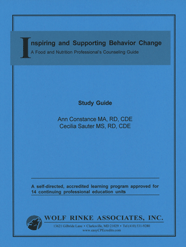|
|
|
|||||||||
|
CPE Home Page List of All Courses/Programs
Share a Program: Order Form FREE:Read & Grow Rich
|
||||||||||
Inspiring and Supporting
Behavior Change:
Book, 142 pgs & Study Guide with 1 Reporting Form, 35 pgs.
For more information and customer comments, click here. Approved/Accepted by CDR, CBDM, NCBDE For RDs/RDNs & DTRs/NDTRs for the Professional Development
Portfolio
Inspiring and Supporting
Behavior Change: ©2012 Wolf Rinke Associates, Inc. CUSTOMER COMMENTS Regina M. Rider: “I love your courses and always get so much out of taking them--I always learn things that I can actually put into practice to improve the level of care I provide.” Elizabeth Goldstein: The information will help me to better counsel my clients and be a more effective dietitian. Karen Dean: I really liked the format of the book. I found it to be very relevant information, and written in an easy style to read. INTRODUCTION AND OVERVIEW Welcome to the self-directed accredited learning program, Inspiring and Supporting Behavior Change. The program consists of a book (142 pages) and study guide (35 pages). This program is designed to help reinforce the importance of counseling skills and enhance your ability to provide quality patient care. While many health care professionals, such as nurses and dietitians have strong clinical skills, this program is designed to help deepen your abilities to inspire and motivate your patients to take actions that will improve their health and the quality of their life. It will also provide you with 14 CPEUs. To get the most out of this self-directed accredited learning program, it is suggested that you adhere to the following four steps: Step 1: Review the objectives in this study guide. Step 2: Read and study the Inspiring and Supporting Behavior Change book. Be sure to complete all exercises contained in the book. Step 3: Assess what you have learned by answering the questions contained in this study guide. Step 4: Compare your answers to the answer key provided in this study guide. If you scored at least 80% correct you are ready to transfer your answers to the CONTINUING PROFESSIONAL EDUCATION (CPEU) REPORTING FORM. If you scored less than 80% correct, re-read this learning program until you score at least 80% correct. After you have successfully completed the program complete the CPEU
REPORTING FORM and We will e-mail your Certificate of Completion. When you submit your CPEU Reporting Form to us via mail, fax or www.easyCPEcredits.com, be sure to write your correct email address in the space provided on the CPE Reporting Form. If writing by hand, be sure to print your e-mail address clearly. To ensure that our e-mails are delivered to your inbox (instead of your junk/spam folders), please add cpesupport@wolfrinke.com to your Address Book or Safe List of allowed email senders. Also, be sure to allow attachments from this email address. Upon completion of this accredited, self- directed learning program, you will be better able to:
TABLE OF CONTENTS Acknowledgments ABOUT THE AUTHORS Ann Constance, MA, RD, CDE Ms. Constance has worked in a variety of settings including hospital, cardiac rehab, outpatient and clinic. She currently serves as the Director of a community based diabetes program that works to strengthen diabetes care and support across a rural 15 county area. In addition, she acts as a consultant on a variety of health care projects. Ms. Constance has also worked as a seminar leader across the country and has delivered many presentations at state and national conferences and for community groups. Along with Cecilia Sauter, Ms. Constance authored the book used in this course - Inspiring and Supporting Behavior Change: A Food and Nutrition Professional’s Counseling Guide. She also co-authored the Northshore Diet, a book with healthful eating tips and recipes for the general public, and has had several articles published in peer reviewed journals. Cecilia Sauter, MS, RD, CDE Ms. Sauter has over 17 years of clinical dietitian and diabetes educator experience. She has worked in a variety of settings including community outreach clinics, hospitals and as the coordinator for the outpatient diabetes education program at a large teaching hospital. She currently serves as the project lead in training nurses, dietitians and PharmDs in helping patients with chronic diseases set self-management goals as well as developing education programs on chronic disease management of heath professional staff. Ms. Sauter is an experienced lecturer, presenting educational programs in a variety of settings. Along with Ann Constance, Ms. Sauter authored the book used in this course - Inspiring and Supporting Behavior Change: A Food and Nutrition Professional’s Counseling Guide. In addition, she has served on the board of the American Association of Diabetes Educators, acts as a reviewer for The Diabetes Educator and has been involved with other diabetes editorial boards. If you prefer to order by phone, mail or fax click below Order Formor click here to contact us with other questions. For information about our other products and services return to the sidebar at the top of the page. |
||||||||||


